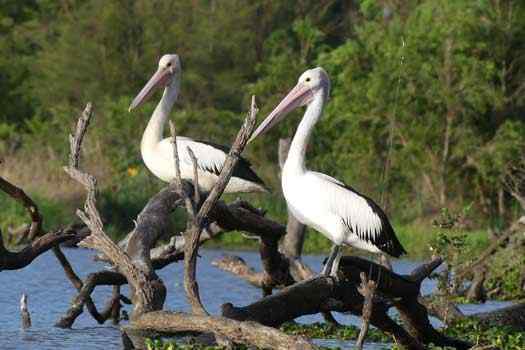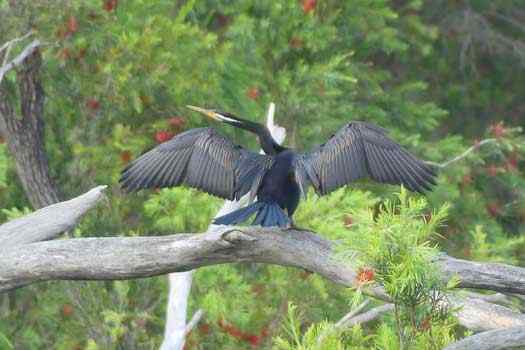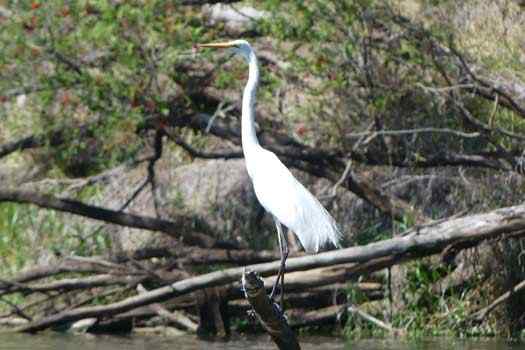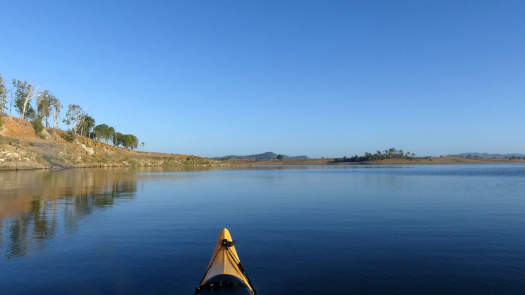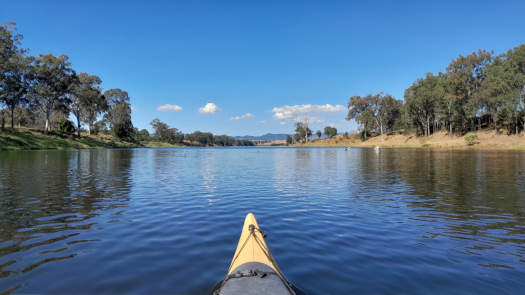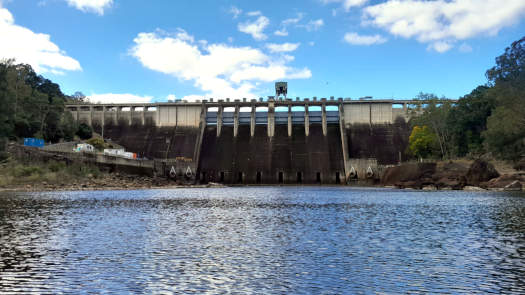Lake Wivenhoe
Upper Brisbane River
Lake Wivenhoe is popular with boats for fishing and campers, but is large enough to ensure you can easily find a bay where you are by yourself especially during weekdays. The lake is surrounded by mostly private farmland with some forested areas
Lake Wivenhoe is South East Queensland’s largest water reservoir and provides the primary supply of water to Brisbane and Ipswich. As such the water level is subject to demand and the lake will be lowest after a long dry spell. When filled the dam contains approximately 5.5 years supply of water. It also plays an important role in flood mitigation and can increase capacity by 68.8% if required.
What to expect
It's narrow profile can make the size deceptive and there are a couple of points that the dam is 3 km wide. The lake is approximately 35 km long but this follows the curves of the land. It is over 50 km from O’Shea’s Crossing to Branch Creek.
While it is flatwater paddling, it is a fairly large body of water so conditions can get rough in stormy or windy weather.
Early morning fog can also be an issue; make sure you have some form of navigation aid and a whistle in these conditions.
Most of the lake is surround with farmland with some adjustant forested areas in places.
Logistics
There are multiple put in spots around the dam. Heading north from the dam wall you have:
† Branch Creek is 2.8 km up the arm from Billies Bay.
‡ O’Shea’s Crossing and Hamon Cove boat ramp were both closed as water levels fell below 50%.
The boat ramp is closed at Hays Landing, but you can easily put in directly from the shoreline.
There are two stop off points with picnic tables, rubbish bins and toilets:
- McKeys Hill
- McGraths Bay
When coming via the Warrego (M2) motorway for a paddle, I use Logan’s Inlet boat ramp rather than Branch Creek, 1 km further away but without the portage. Otherwise, simply pick the one nearest to the location that you want to explore!
The dam and recreation facilities are open to the public seven days a week at the time of writing, from 5:30am to 6:30pm (September – April) and 6:00am to 5:30pm (May – August).
At 55% capacity O’Shea’s Crossing appears to start drying up, and by 45% capacity, there is a second dry section found downstream before the Stanley River.
Features and facilities
Primary point of truth for the lake should be the official SEQWater published Location maps and guides.
The following is a rough guide about different locations around the lake. Since the lake levels do fluctuate, distances could vary considerably as the water level drops.
Low water levels will prevent access up the Brisbane and Stanley rivers.
† Most of the features were taken from SEQWater published
Location maps and guides.
‡ Distances are approximate only and are based on roughly staying near
the shoreline while crossing most of the lakes sidearms. These crossings may be up to
1 km wide.
Access Restrictions
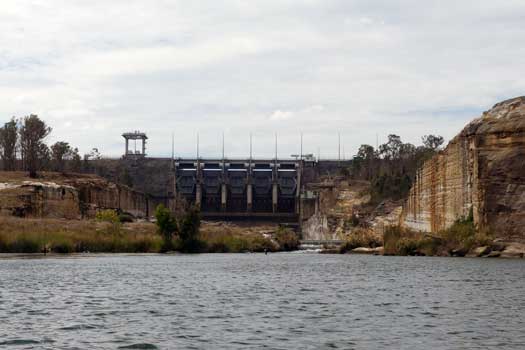
Access is restricted directly above the dam wall, roughly between McGraths Bay and Wivenhoe Hydro Power Station.
Refer to the SEQWater Lake Wivenhoe guide for up to date information.
Map
Explore the key locations in the map below. Most locations will have a photograph that can be seen by clicking on the icon or number in the map itself.
- Spillway
- Wivenhoe Hydro Power Station
- Stanley River
- Somerset Dam Wall
- Boat Ramps
- Campsite
- Water Access Onlys
- Kayak Ramp or Paths
- Access Point
- Viewpoint
- Water Feature
What to take
Ensure electronic devices and gear have waterproof containers / dry bags if needed.
What to wear
- Sunscreen / Chapstick *
- Sunglasses *
- Hat *
- Swimwear or shorts †
- Sun protective clothing (rashie) †
- Water shoes †
What to take
- Water
- Snacks
- Phone
- Camera
- Watch
- Sponge
- Rain jacket
- Spare clothes / Towel
Safety
- PDF (life jacket) *
- Whistle
- Paddle float ‡
- Bilge pump ‡
- Paddle lease *
- Spare paddle
- Light (night paddling)
* Highly recommended (aka required)
† You should wear clothing and footwear that you can comfortably swim in.
‡ These are for self or assisted rescues as there are places that you can't easily swim back to the shore.
Wildlife
There is a wide variety of birdlife on the lake. Darters, Cormorant (often large flocks), Egrets, Pelicans, Coots, Ducks and Swans are common on the water and a large array of other species can be seen along the shoreline.
You could be lucky and see some turtles before they dive into the water, as well as getting a sudden visit by the large and protected Australian Lungfish coming up for air. Native mammals are less frequent, but occasional kangaroos can be seen along the water's edge
Quick Stats
- Lake / Reservoir
- Lake Wivenhoe
- Dam / Weir
- Wivenhoe Dam
- Waterway
- Brisbane River
- Perimeter
- 200 km
- Capacity
- 1,165 GL
- Flood Mitigation
- 802 GL
- Catchment
- 7,020 sq km
- Area
- 109.4 sq km
- Council Areas
- First Nations
- YuggeraWaka Waka
- Directions To
- Logan’s Inlet
Hamon Cove
Hays Landing
O’Shea’s Crossing
Tributaries
Upper Brisbane River
This is a wide flatwater section between 150 m to 300 m wide in the reach of the lake, but is characterised by riffles and shallow pools past this reach that is best considered as an intermittent river as it will mostly stop flowing in the dry season.
O’Shea’s Crossing is the primary access point. This is 4 km above the Stanley River confluence, and it's another 11 km before you truly get into the main lake section.
You should be able to paddle at least 5 km upstream from O’Shea’s Crossing when the lake is 80% full, and as much as 15 km at 100%.
There may be a noticable current heading upstream after rain, this will be very strong in flood.
Stanley River
There is a short pleasant paddle up the lower Stanley River.
It is 4 km to the start of the Stanley River from O’Shea’s Crossing and another 7.3 km to the dam wall, making for a 23 km return paddle.
Mostly wide and open river, with the oppunity to explore up to 2.5 km up Reedy Creek when the lake is high. You should be able to circumnavigate Stanley Island (just downstream of Reedy Creek) at around 75% capacity.
Take care as there could be an increase in the release from Somerset Dam without warning. This section will have a strong flow when the dam is spilling.
Branch Creek
This really doesn't have much of a reach from the lake, but the lake arms of Branch and Northbrook creeks make for a short and possible more shelthered day trip.
Put in from Billies Bay Boat Ramp or Branch Creek landing (20 m portage).
Sandy Creek
Short reach of the lake goes into the forested area of the nature reserve.
It is a 10 km paddle from Hamon Cove, and up to another 5 km in the creek itself depending on the lake level, though much of this is in a wide open arm of the lake.
Sandy Creek
- Length
- 20 km
- Navigable
- 2 km
Burrundon Bay
Large bay that leads to the 13 km long Esk Creek that usually doesn't have much of a reach to paddle.
It is a 35 km return paddle from Hamon Cove.
Coal Inlet
Lower lake levels has a small channel into the inlet with a small reach up Coal Creek. This becomes an arm of the lake when this is 100% full.
A long 20.5 km paddle from Hamon Cove or 15.2 km paddle from O’Shea’s Crossing (both one way) and up to 3 km for Coal Inlet itself.
Coal Creek
- Length
- 6.2 km
- Navigable
- 1.5 km

